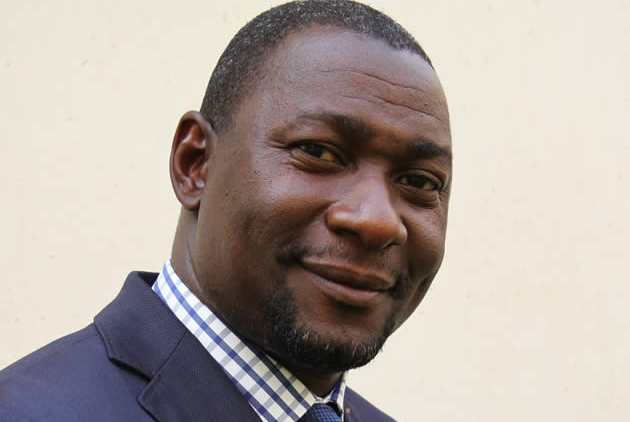Seven months after we beat them here, the Aussies are now world champs


BEATING THE VERY BEST . . . Zimbabwe’s Prosper Utseya is congratulated by teammate Tendai Chatara after scoring his match-winning six over Australia at Harare Sports Club in August last year. — AFP
Robson Sharuko Senior Sports Editor
AMID an explosion of fireworks at the Melbourne Cricket Ground yesterday, Australia celebrated another World Cup triumph, exactly seven months after these cricketers made headlines around the globe, after a humbling loss to Zimbabwe at Harare Sports Club.
Six of the Australians, who featured in yesterday’s seven-wicket win over New Zealand in the ICC Cricket World Cup final, were in that team that fell to a three-wicket defeat to Zimbabwe in a triangular tournament that featured South Africa.
On August 31, last year, Zimbabwe’s cricketers wrote headlines around the world after turning on the style to beat Australia, for the first time in 31 years, amid hysterical scenes at Harare Sports Club.
Aaron Finch, who opened the batting for the Aussies in the World Cup final yesterday, also opened for them in that match against Zimbabwe.
Yesterday, he fell for a duck, after being caught and bowled by the impressive Trent Boult, and six months ago, he scored 11, against Zimbabwe, before he perished after he was bowled by John Nyumbu on a spin-friendly wicket.
Skipper Michael Clarke, who top-scored for Australia with 74 in his final ODI match for his country, lifting the World Cup as he said goodbye to this format of the game, also top-scored for the Aussies with an unbeaten 68, as he battled injury, in that game against Zimbabwe at Harare Sports Club.
Glen Maxwell did not bat yesterday, he wasn’t needed as the Australian top order fired and powered to victory at the MCG, but he played a big part in the match, as he always does, grabbing a wicket to end with 1-37 from seven overs, and then running out Tim Southee with a blinder of a throw.
Maxwell played in that match at Harare Sports Club, and was bowled cheaply for 13 from 17 balls, after falling to Malcolm Waller.
He then took 1-41, off eight overs, with the ball.
Wicket-keeper Brad Haddin also did not bat yesterday but his blinding catch, to dismiss Ross Taylor when he was on 40 and had put together a good partnership with Grant Elliot, was the turning point of this game as it triggered a Black Caps collapse.
Haddin played in that match at Harare Sports Club, scoring 49 in 66 balls, before he fell to Donald Tiripano.
All-rounder James Faulkner was named player-of-the-match in the World Cup final after taking 3-36 in Melbourne yesterday in his nine overs.
He batted in Harare, something that he has a made a name for himself as a big-hitting finisher, but fell for a duck when he was caught by Nyumbu, off the bowling of Proper Utseya.
He failed to pick a wicket, in his seven overs, which went for 28 runs.
Mitchell Starch was named player of the World Cup, for his 22 wickets, and was part of the Aussie team that fell in Harare, six months ago, bowled for just 3 by Sean Williams , and taking 2-41 from his 10 overs in his bowling spell.
Australia won the final yesterday with 101 balls to spare as the Black Caps crumbled under pressure in Melbourne and the Zimbabwean cricketers, who failed to get past the group stages, with just one win over the United Arab Emirates in six games, will look back to that day, six months ago, when they humbled the team that was on its way to be the champions of the world.
Australia struggled to 209-9, when they batted first that day, but Zimbabwe, powered by Elton Chigumbura’s half century, sealed the win with a six off Utseya, for their 211-7, a result that created headlines around the world.
Yesterday, Clarke said he had found it hard to deal with the loss of his teammate, Phil Hughes, who was at Harare Sports Club that day, and opened with Finch, and scored only 10, in 30 balls, before he fell to Utseya.
“Hughesy is thought about and spoken about on a daily basis,” Clarke said yesterday.
“I think probably the last couple of months for me personally, it’s probably been harder than when he first passed away. I’ve been in regular contact with his sister and his family.
“And I know they would have been watching tonight. I guess that’s what makes it so special, that we are still thinking about him. We are still talking about him, and we always will.
“Like I say, I won’t play another game, I certainly won’t play a Test match without his Test number on my heart, and I’ll wear this black armband for the rest of my career. You know, we’ve spoken about it as a team. We believe we played this World Cup with 16 players in our squad, and that will continue for the rest of my career, that’s for sure.”
Cricinfo writer, Brydon Coverdale, more than any other journalist, probably captured the significance of that stunning Aussie loss in Harare.
“For the players, coaches and selectors it will serve as a timely reminder that you can be too clever for your own good. It is courting trouble to underestimate your opponents. Better to be reminded of that now than in a World Cup,” he wrote.
“Trevor Hohns, the selector on duty, looked a lonely figure as Australia slid towards defeat, sitting in an empty bank of chairs in front of the change rooms.
“He quit as Australia’s chairman of selectors in April 2006, after the team had just won a Test series in South Africa 3-0. Now, on his first tour having been reinstated to the selection panel, he has picked a team that lost to Zimbabwe.
“Australia thought victory over Zimbabwe was a sure thing. They won’t admit that. But there is no other reason to have left Mitchell Johnson out of the side. There are occasions when fast bowlers need a break, but two matches into a one-day series after a long winter’s break is not one of them.
“ They wanted to see other options. Now they’ve seen them, don’t expect Johnson to rest again any time soon.
“Not that Mitchell Starc, Mitchell Marsh, Ben Cutting and James Faulkner had much to work with on a Harare pitch that held the ball up more than a clay tennis court. Johnson has shown at venues like Adelaide that he can still make batsmen hop on slow surfaces, and Zimbabwe’s batsmen must have breathed easier when they discovered he wasn’t playing.
“There was nothing there for the rest of the seamers.
“This loss will teach Australia some lessons but will ultimately cost them little. For Zimbabwe, it will make heroes of men like Elton Chigumbura and Prosper Utseya, and will boost the team and their fans immeasurably.”











Comments